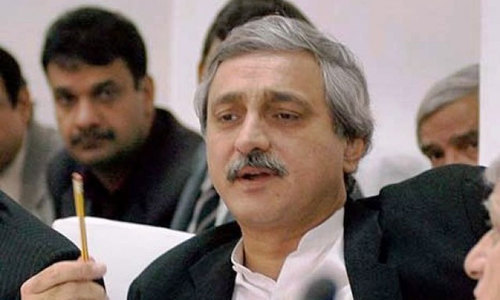The Supreme Court on Thursday ordered the counsel of Pakistan Tehreek-i-Insaf (PTI) leader Jahangir Tareen to submit a reply to the points raised by Attorney General Ashtar Ausaf in connection with the laws of the Security and Exchange Commission of Pakistan (SECP) .
A three-member bench of the apex court — headed by Chief Justice Saqib Nisar and comprising Justice Umar Ata Bandial and Justice Faisal Arab — was hearing a petition filed by PML-N's Hanif Abbasi, which seeks the disqualification of PTI chief Imran Khan as well as Tareen over the alleged non-disclosure of assets, existence of offshore companies, as well as receiving foreign funding for the party.
During the hearing, Ausaf argued that Tareen earned more than Rs70 million in shares trading and confessed to earning this money in an illegal manner. He further said that initially, Tareen did not raise any objection to the SECP's action against him.
According to Ausaf, the SECP had already taken its final decision and that cannot be challenged at another forum.
In response, Justice Faisal Arab commented that the action has already been challenged before the apex court. To this, Ausaf said that the transaction [between Tareen and the SECP] could not be reversed even if a section of the SECP's laws was unconstitutional.
The court ordered Tareen's counsel to submit a written reply in response to the points raised by the AG.
The hearing was adjourned until Thursday after PTI chief Imran Khan's counsel Naeem Bokhari sought a week to prepare his arguments.
In an earlier hearing, the court had questioned whether or not Tareen acted fairly as the director of JDW Sugar Mills when the SECP had ordered him to pay a fine of Rs70 million in 2005 when his employees engaged in insider trading. Tareen's counsel had said that his client wished to close the matter with the SECP as he had already paid a fine to the regulatory body.
In another hearing, Abbasi's lawyer Azid Nafees had argued that Tareen should be disqualified as he had engaged in insider trading and acquired income through such activity. He added that Tareen had confessed his involvement in insider trading and also paid a penalty for it to the Securities and Exchange Commission of Pakistan on January 12, 2008. "This is enough to declare [Tareen] dishonest," the lawyer had said.
Advocate Nafees had argued further that the PTI leader had violated Sections 15A (prohibition of insider trading) and 15B (inside information) of the Securities and Exchange Ordinance, 1969. "Does the violation of the law amount to dishonesty?" the chief justice had asked. "Can the violation of every law be grounds for disqualification?"
"You will have to prove Tareen was dishonest regarding insider trading," the judge had added.














































Dear visitor, the comments section is undergoing an overhaul and will return soon.